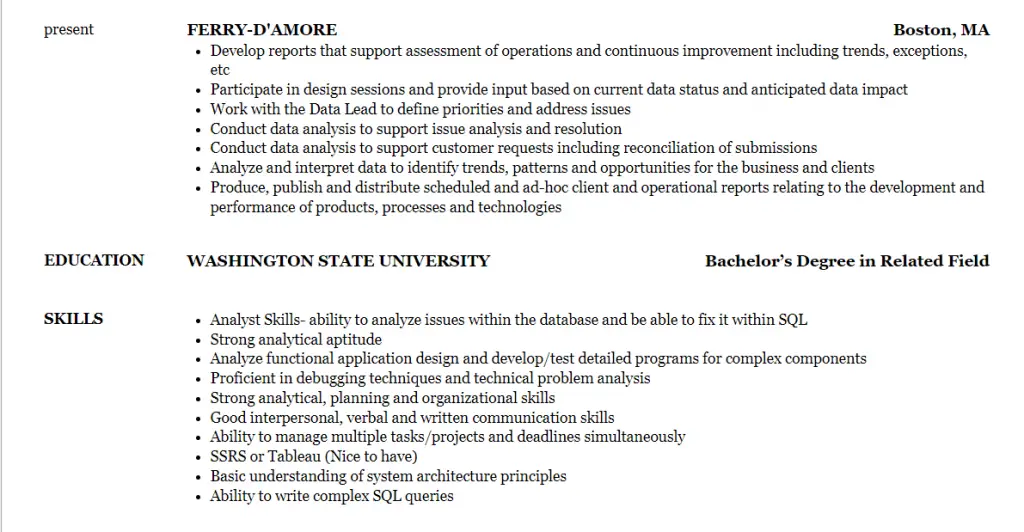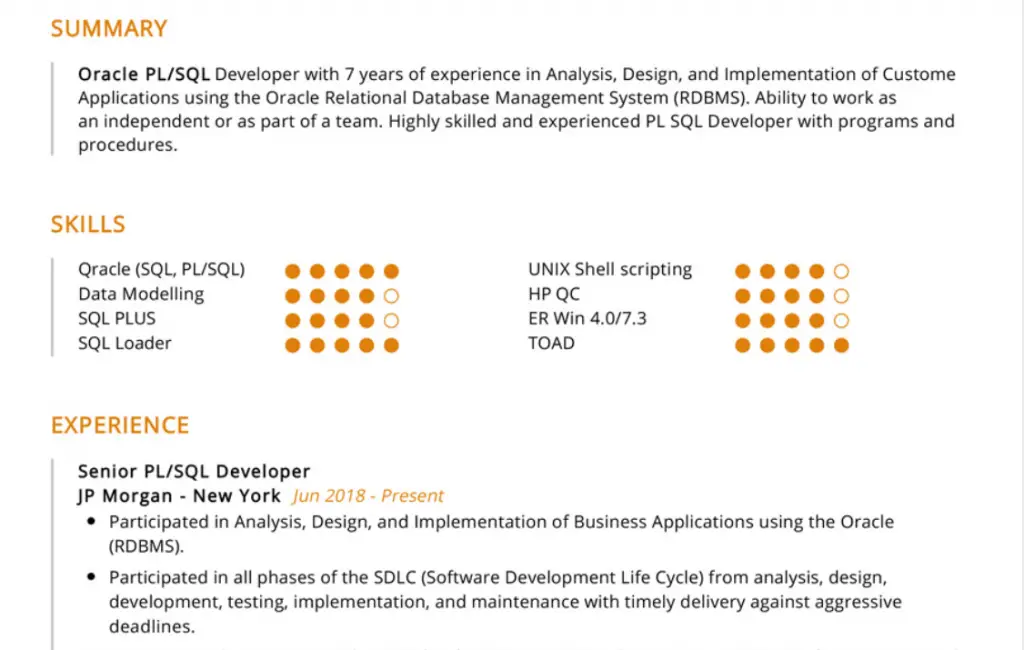When writing your own resume, it’s important to list your skills in a way that is both professional and eye-catching. If you’re looking for inspiration on how to do this, look no further than our guide on how to put SQL on a resume. Become a pro with us and list your SQL background today!
Should you ever add SQL to the skill set?

Many people think that even if the vacancy is not related to databases, programming, or web development, there is a great chance that the potential employer will appreciate the presence of SQL in your resume. The reason for this is simple – the knowledge of SQL can come in handy in any field, from marketing to sales.
If you’re a developer, chances are you’ve asked yourself if it’s necessary to list your SQL skills on your resume. The answer is yes. In today’s job market, especially in tech and programming-related fields, being able to use structured query language is becoming increasingly important.
In order to look appealing to potential employers when applying for computer-based positions, make sure your resume demonstrates you have SQL programming skills. By displaying what you know and can do, many opportunities will come your way.
Thus, whenever you see a job ad that piques your interest, don’t hesitate to add SQL to your skillset on the resume – you never know when it might come in handy!
Is SQL considered a skill?
SQL is a high-demand technical skill because of its data analysis capabilities for companies in many industries. SQL experts are essential for companies, and they earn good salaries, even at the entry-level. Indeed analyzed over 32,000 data job listings to show the demand for SQL knowledge. Besides, SQL is easy to learn, and there are many free resources online that can help you get started if you don’t have any previous experience.
What section to use?
As you know, a good resume should be well-constructed and well-organized. It is important not only what information you include in your resume but also how you present it.
When deciding where to put SQL on your resume, think about what other skills or qualifications you have that are related to the position you’re applying for. For example, if you’re applying for a position as a web developer, it would make sense to list your SQL skills under the “Skills” section of your resume. However, if you’re applying for a position as a sales manager, it might be more appropriate to list your SQL skills under the “Work Experience” section, as they would likely be relevant to the job.
At the same time, if you want to highlight your SQL skills, you can create a separate “Skills” section on your resume and list them there. This is a great way to ensure that your SQL skills are noticed by potential employers.

How to put SQL on resume?
You may include SQL skills on your resume by putting them in the summary section, which you may notice if you’re learning how to put SQL abilities on a CV. If the role for which you are applying requires SQL expertise, adding it to the summary part is an excellent alternative. This will show that you’re a well-rounded candidate with the right skill set for the job.
If you want to put focus on your SQL skills, another way to do this is by creating a separate section on your resume specifically for these abilities. This will make it easier for potential employers to see what you know and what you can do.
Depending on the level of experience you have, there are different ways to list SQL skills on your resume:
- If you’re a beginner: If you’re just starting out, the best way to include SQL on your resume is by listing it as a skill under the “Skills” section. You can also mention any relevant coursework or training in this section.
- If you have intermediate skills: For those with some experience, it’s best to create a separate “SQL Skills” section on your resume. In this section, you can list your abilities as well as any relevant projects or courses you’ve completed.
- If you’re an expert: If you consider yourself an expert in SQL, then you should highlight your skills in both the summary and the skills section of your resume. You can also include information about any relevant awards or certifications you may have received.
By shortened forms, we mean acronyms. For example, list SQL skills instead of structure query language as this is what employers will understand. When adding the skills to your resume, you can list them one after another without any fuss. However, for some skills listing years of experience may make employers take notice.

Here are several examples of what you can write in your resume.
(For junior and middle specialists)
Skills:
– SQL with 2 years of experience
– Data analysis
– Excellent communication and writing skills
– Ability to work in a team
(For senior specialists)
Skills:
– SQL – 5 years of experience
– Data analysis – 4 years of experience
– Excellent communication and writing skills
– Ability to work in a team
– Experience leading a team of 5+ people
If you want to put SQL on resume but not in the Skills section, you can write it down in the Work Experience. Here are a few examples:
Work experience:
- Web Developer at XYZ Company. Worked with SQL to create and maintain databases.
- Sales Manager at ABC Company. Used SQL to track customer data and generate reports.
- Junior Analyst at LMN Corporation. Wrote SQL queries to extract data for analysis.
As you can see, there are different ways to list your SQL skills on your resume, depending on your level of experience. However, one thing remains the same – regardless of your level, it’s always best to be concise and to the point. Employers don’t have time to read through lengthy resumes, so make sure yours is clear and easy to read.
How do you describe SQL skills?
With SQL skills, data experts can easily maintain, create and retrieve information from relational databases. This type of database separates data into columns and rows, which makes it easier to access, update, manipulate, insert and modify data. Thus, including SQL on your resume will demonstrate to employers that you have the ability to work with databases.
So, how do you list SQL on your resume? Here are some tips:
- Include a “Skills” section on your resume and make sure to list SQL as one of your skills.
- Describe your level of SQL experience. If you’re a beginner, mention that you’re still learning the ropes. If you’re more experienced, highlight your expertise in specific areas such as database design or query optimization.
- Provide examples of projects where you used SQL. This could be anything from designing a database for a small business to querying millions of records for a large corporation.
- Use industry-specific keywords. Employers in the tech industry, for example, often use terms like “SQL Server” or “MySQL” when searching for candidates with SQL skills.
- Stay up to date with the latest SQL trends. As technology evolves, so does the way we use SQL. By keeping up with the latest trends, you’ll show employers that you’re invested in your craft and that you’re always learning new things.
Should I write SQL or MySQL in my resume?
If your goal is to develop applications that use a MySQL backend, you will need to know SQL – and possibly Object-relational mapping tools like Hibernate in Java or similar tools for other languages. Therefore, you should focus on learning SQL. Thusly, writing SQL or MySQL in your resume would be acceptable.
However, many HR vacancy descriptions ask for SQL Server, so it might be a good idea to mention both in your resume. When listing your skills on your resume, always use the shortened forms of the names to make it easier for employers to understand what you’re saying.
By following these tips, you can be sure that your SQL skills will be listed correctly on your resume and that you’ll stand out from the crowd of other candidates.
Bottom line
List your skills like a pro by following the tips in this article. Put SQL skills on your resume and be sure that the next time you apply for a job, you’ll have a better chance of getting hired. Be sure you write it in a way that is both clear and concise.
And most importantly, don’t forget to keep up with the latest SQL trends – it’ll show employers that you’re always learning new things and that you’re invested in your craft. Thanks for reading!
